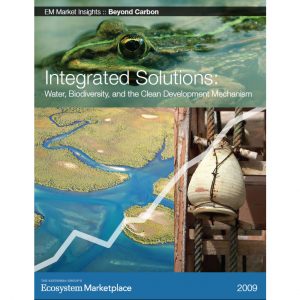Integrated Solutions
View PublicationThe use of markets and market-based mechanisms to conserve and pay for ecosystem services is a growing global trend that is gaining a solid foothold not just in the carbon markets, but also in biodiversity and water markets. Furthermore, these payments for ecosystem services (PES) are a practice that is no longer solely important to environmentalists but has become of essential interest to small local communities, government regulators, businesses, and financiers all over the world. This booklet is meant to provide context and background information on current developments in the PES arena relevant to the Ghana Katoomba conference, held in Accra, Ghana, on October 6-7, 2009. The conference is the fifteenth in a series of Katoomba conferences designed to stimulate and strengthen environmental markets around the world.
West Africa has come late to the PES table, but it’s hard to think of a more appropriate guest: the resource-rich Continent stands before a development boom that threatens to destroy the very resources that will fuel its growth for the next century, and PES schemes can help to preserve this natural legacy by recognizing the economic value of nature’s services. Schemes that promote sustainable water use are just now beginning to take hold, and scores of pilot projects designed to preserve biodiversity are also in the works.
Massive hydroelectric development projects along the Congo and other rivers promise to deliver clean energy to growing cities – but at the cost of habitat important to thousands of species. In the future, we can expect to see the implementation of biodiversity offsets that enable the development of clean energy projects that also have a net positive impact on habitat for endemic species.
Over the past five years, several such projects have been proposed, and a growing number of people have begun to call for mitigation of damage to marine habitat that results from large-scale hydroelectric projects. A few of these projects even made it to the pilot phase – but a lack of will and financing has left them languishing before conclusions should be drawn. We can expect this to change as the region’s prosperity grows and its priorities shift to the long-term preservation of habitat – for food species as well as for endangered animals in general.

